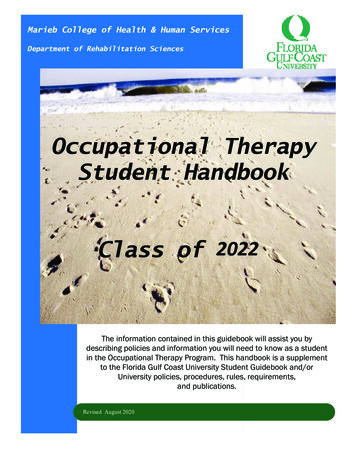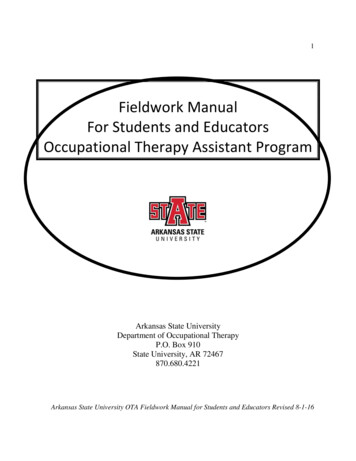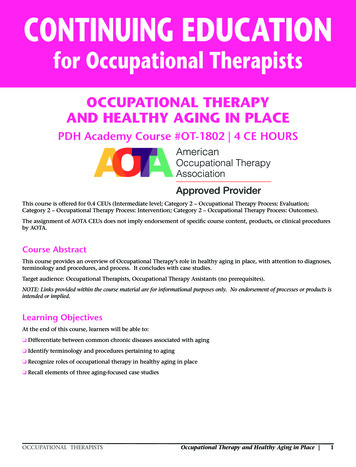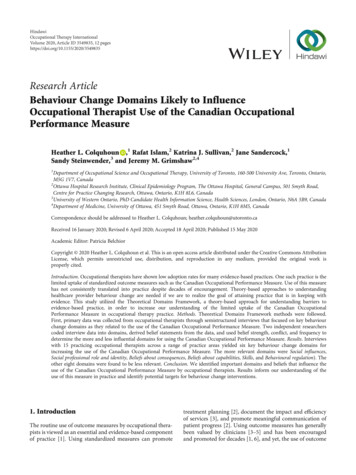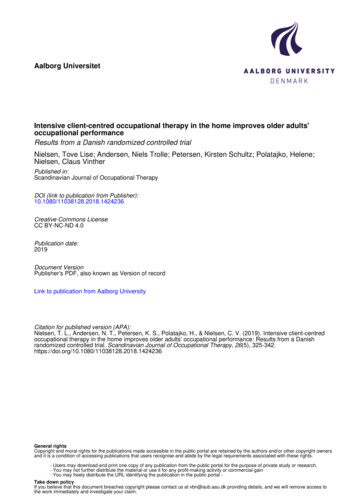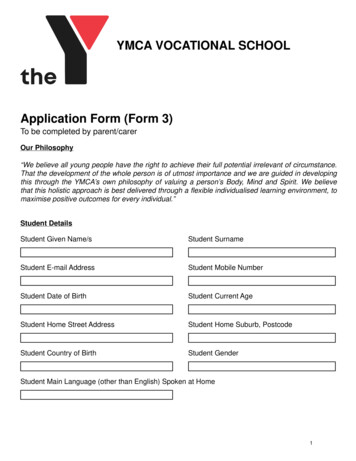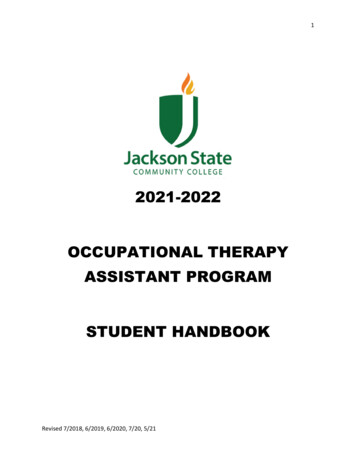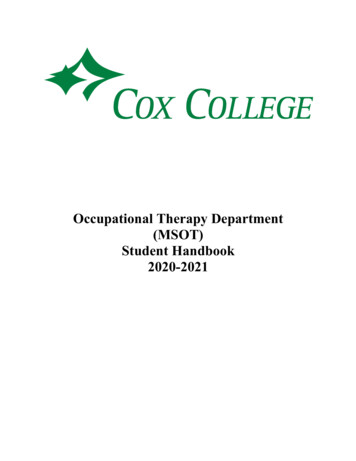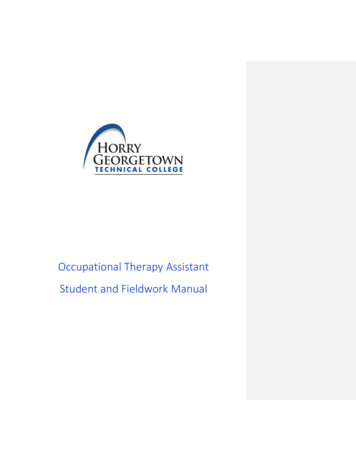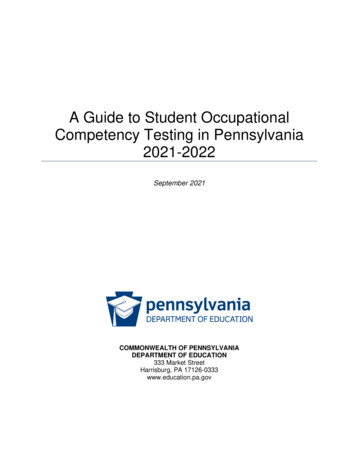
Transcription
A Guide to Student OccupationalCompetency Testing in Pennsylvania2021-2022September 2021COMMONWEALTH OF PENNSYLVANIADEPARTMENT OF EDUCATION333 Market StreetHarrisburg, PA 17126-0333www.education.pa.gov
Commonwealth of PennsylvaniaTom Wolf, GovernorDepartment of EducationNoe Ortega, SecretaryOffice of Elementary and Secondary EducationSherri L. Smith, Ed.D., Acting Deputy SecretaryBureau of Career and Technical EducationLee Burket, Ed.D., DirectorDivision of Data Analysis, Assessment & ContractsMonique Burton, Division ManagerThe Pennsylvania Department of Education (PDE) does not discriminate in its educational programs,activities, or employment practices, based on race, color, national origin, [sex] gender, sexual orientation,disability, age, religion, ancestry, union membership, gender identity or expression, AIDS or HIV status, orany other legally protected category. Announcement of this policy is in accordance with State Lawincluding the Pennsylvania Human Relations Act and with Federal law, including Title VI and Title VII ofthe Civil Rights Act of 1964, Title IX of the Education Amendments of 1972, Section 504 of theRehabilitation Act of 1973, the Age Discrimination in Employment Act of 1967, and the Americans withDisabilities Act of 1990.The following persons have been designated to handle inquiries regarding the Pennsylvania Departmentof Education’s nondiscrimination policies:For Inquiries Concerning Nondiscrimination in Employment:Pennsylvania Department of EducationEqual Employment Opportunity RepresentativeBureau of Human ResourcesVoice Telephone: (717) 783-5446For Inquiries Concerning Nondiscrimination in All Other Pennsylvania Department of EducationPrograms and Activities:Pennsylvania Department of EducationSchool Services Unit Director333 Market Street, 5th Floor, Harrisburg, PA 17126-0333Voice Telephone: (717) 783-3750, Fax: (717) 783-6802If you have any questions about this publication or for additional copies, contact:Pennsylvania Department of EducationBureau of Career and Technical Education333 Market Street, 11th Floor, Harrisburg, PA 17126-0333Voice: (717) 783-6623, Fax: (717) 783-6672www.education.pa.govAll Media Requests/Inquiries: Contact the Office of Press & Communications at (717) 783-9802
Table of ContentsIntroduction .1Student Occupational Competency Testing Program Policies.1Requirements Governing the Testing of Career and Technical Education Students. 1Definitions. 2Who Should Be Tested? . 2Who Should Not Be Tested? . 2Mandatory Use of PAsecureID Numbers . 3Approved Tests. 3Ordering and Costs . 4Defined Roles and Responsibilities . 4Testing Window . 7Pennsylvania Student Test Crosswalk . 8Test Makeup . 8Test Retakes . 8Returning Test Materials . 8Related Test Instruments . 9Photocopying NOCTI Test Materials . 9NOCTI Multiple-Choice Test Requirement. 10Administration and Technical Requirements for NOCTI Online Testing . 10Test Security . 10NOCTI Testing Process . 11Before Test Administration . 11During Test Administration . 12After Test Administration. 13NIMS Testing Process. 13Basic Skills Tests . 13Online Registration . 14Online Multiple-Choice Test. 14Performance Test . 15NIMS Reporting . 16Required Forms . 16Scores and Certificates . 17Pennsylvania Occupational Performance Level Descriptors . 17Pennsylvania Certificates. 17Pennsylvania NOCTI Student Test Cut Scores . 17Determining Performance Level. 19Receiving Certificates for NOCTI Tests . 19Receiving Certificates for NIMS Tests . 19Accommodations . 20Students with Individualized Education Programs (IEPs) . 20Revised September 2021
NOCTI Allowable Accommodations . 21English Learners (ELs). 23Resources . 23Pennsylvania Testing Program Website . 23NOCTI Resources . 23NIMS Resources . 24Contacts . 24Revised September 2021
IntroductionThis guide is provided to assist school personnel in preparing for the required studentoccupational competency testing of all secondary concentrators in approved career andtechnical education (CTE) programs in the commonwealth. It was developed by thePennsylvania Department of Education (PDE) to be used as an informational resource andaddresses policies and procedures for participating in federal and state mandated occupationalcompetency testing. Complete materials, guidebooks, and required forms are available on theStudent Occupational Competency Testing program website.Student Occupational Competency Testing Program PoliciesPDE requires all secondary concentrators (refer to the definitions on the next page), anticipatedto graduate from high schools in the current school year from their approved CTE programs andreceive diplomas from their high schools, to take a state-approved occupational competencytest. This requirement includes students with Individualized Education Programs (IEP).This testing policy meets the requirements of the Strengthening Career and TechnicalEducation for the 21st Century Act (P. L. 115-224) and Chapter 4 of Title 22 of the PennsylvaniaCode (22 Pa. Code § 4.31(a)). All concentrators who anticipate graduating are expected toparticipate in occupational competency testing. Failure to comply will affect Pennsylvania’sability to meet the requirements of the statewide system of measures and standards and mayresult in sanctions against a school under 22 Pa. Code § 4.31(a), Chapter 339 of Title 22 of thePennsylvania Code (22 Pa. Code § 339.4(e)(1)(i)), or the Strengthening Career and TechnicalEducation for the 21st Century Act (P. L. 115-224).Accountability of school programs becomes more significant each year to students, parents,instructors, administrators, school boards, and PDE. The occupational competency tests used inthis program are based on state, national, and/or industry-based standards. These standardsare usually consistent with local curricula; however, local administrators are encouraged toidentify gaps between the local curriculum and national standards and exert efforts to close anyidentified gaps.Requirements Governing the Testing of Career and TechnicalEducation StudentsSeveral state and federal requirements dictate the testing of CTE students. 22 Pa. Code §4.31(a) requires an occupational competency measure for all secondary and adult career andtechnical education program concentrators who are scheduled to graduate. In addition, theStrengthening Career and Technical Education for the 21st Century Act (P. L. 115-224) requiresthat each state develop a system of core performance measures and standards for the purposeof evaluating its secondary, adult, and postsecondary CTE programs. Lastly, Pennsylvania is aunified state where federal and state CTE programs are part of the Governor’s Executive Orderfor the Pennsylvania Workforce Investment Board, which calls for an integrated workforceinvestment system with core performance measures and standards. Testing results are used toaddress the federal and state performance accountability requirements of the StrengtheningCareer and Technical Education for the 21st Century Act (P. L. 115-224) and 22 Pa. Code §339.4(e)(1)(i), both of which involve the use of third-party end-of-program occupational tests tomeasure technical skill attainment.Revised September 20211
DefinitionsThe following definition should be used by school personnel to identify students required toparticipate in this occupational competency testing program:Secondary Concentrator – A student who completes at least two state-defined CTE courses.Pennsylvania defines a CTE course as a minimum of 240 technical instructional hours asplanned per year in a PDE-approved CTE program. Completing at least 480 technicalinstructional hours is required for PDE-approved one-year CTE programs.NOTE: Completing means passed the course and earned credit.Contact Kevin Springman in PDE’s Bureau of Career and Technical Education at (717) 7836623 or kspringman@pa.gov for more information on this definition.Who Should Be Tested?22 Pa. Code § 339.22(a)(9)(ii)(c) requires approved programs to end in grade 12. If a student isa secondary concentrator and anticipated to graduate at the end of the current school year, thenthat student should be tested whether or not they will complete the program’s technical hours. Astudent with an IEP whose Transition Plan indicates they will be staying in school for extendedyears beyond the grade 12 should be tested in the spring of the final year in school.If a student transfers schools, the school where the student is enrolled after transferring shoulddetermine the amount of the student’s program hours from the former school’s CTE programwhich can be counted toward the number of technical hours completed by the student duringthe CTE program. If the total number of technical hours completed in a program is 480 or more,then the student is a secondary concentrator and should be tested.For a student who changes programs, the secondary concentrator definition must be followedwhen determining if a student is eligible to participate in occupational competency testing. Thisis a local decision similar to applying hours for a student transferring from a CTE program atanother school.Who Should Not Be Tested?1. Juniors who are not graduating high school;2. Students who will not meet the definition of a secondary concentrator by the end of theschool year in which they are anticipated to graduate;3. Students who are attending less than two hours of technical coursework per day at asending high school while enrolled in a full-day, one-year CTE program at a career andtechnical center; and4. Students who meet the requirements for the Pennsylvania Alternative System ofAssessment (PASA).Students who take the PASA are considered exempt from participating in this occupationalcompetency testing program; however, students who take the PASA may be tested with therecommendation of the IEP team. See the Accommodations section in this guidebook.Revised September 20212
Mandatory Use of PAsecureID NumbersAs part of the Pennsylvania Information Management System (PIMS), PAsecureID numbershave been assigned to all pre-kindergarten through grade 12 public school students. Theseunique, permanent student identification numbers:1.2.3.4.Eliminate the need for a Social Security number to identify a student;Protect personally identifiable information;Improve security and confidentiality; andEnable student records to be safely and appropriately linked between systems andacross time to make longitudinal data analysis possible.PDE’s Bureau of Career and Technical Education requires student PAsecureID numbers to beused as student identifiers in this testing program for all NOCTI and National Institute forMetalworking Skills (NIMS) tests. It is the school’s responsibility to ensure all PAsecureIDnumbers are accurate.Failure to provide accurate PAsecureID numbers will result in student data not being reportedon federal and state annual reports and could impact continued CTE approval status.Approved TestsPDE has identified NOCTI and NIMS as approved occupational testing agencies. Additionalinformation about these approved agencies is provided below. Tests must be administered intheir entirety to be considered a complete test. Only students who take a complete test will beconsidered a complete test taker for the PIMS completion code. Only complete tests will counttowards the eligibility of Pennsylvania certificates. Partially administered tests will be identifiedas incomplete tests.NOCTI Tests – These tests consist of two components. The multiple-choice componentassesses factual knowledge, technical information, and the understanding of principles andproblem solving. The performance component allows students to demonstrate the skills theyhave learned to function in their desired job. NOCTI tests are nationally normed and must begiven in their entirety. Reported scores on NOCTI tests are both criterion-referenced and normreferenced. NOCTI tests are designed around criteria for job readiness. Raw scores areprovided for the criteria as well as local, state, and national norms. To be considered a completetest taker for the PIMS completion code, students must take both the multiple-choice andperformance components of the test.NIMS Credentialing Tests – PDE has mandated the use of NIMS Machining Level 1 testsas the acceptable occupational competency test for students in machining-related approvedCTE programs. The NIMS credentialing tests are drawn from industry-validated metalworkingstandards. Both performance and theory tests are developed and piloted by the industry. To beconsidered a complete test taker for the PIMS completion code, students must take at leastthree NIMS Level 1 Machining credentialing tests. NIMS credentialing tests without theperformance affidavits submitted are not considered complete and are not counted towardscertificate eligibility or state reporting.Revised September 20213
Ordering and CostsNOCTI Tests – PDE will assume the costs of online multiple-choice tests, student performancetest booklets, scoring, and reporting services for schools meeting the requirements of thistesting program. Costs are automatically assumed by PDE when orders are processed directlythrough the Education Resource Center at Penn State Greater Allegheny using the online PDEorder form found on the NOCTI Client Services Center. Costs of materials and supplies requiredfor performance tests are the responsibility of the school.Tests must be ordered at least four weeks prior to the scheduled testing date(s) to allow forprocessing, shipping, and to avoid any additional shipping charges to the school, including a 10percent rush order fee (minimum 25) imposed by NOCTI. Additional fees will be applied basedon expedited shipping selection; these fees will vary depending on each order. Contact NOCTIto determine additional costs associated to expedited shipping. Also, schools are responsible forassuming the costs associated with unused tests. Schools will be billed for these unused testsby the Education Resource Center at Penn State Greater Allegheny at the current cost per test.NIMS Credentialing Tests – For each student who wishes to receive NIMS credentialcertificates, PDE will assume the cost of an Entry Level I Machining 1-year subscription andscoring and reporting services for this occupational competency testing program. Included in thesubscription are 11 Machining tests and one Metalforming test with unlimited retakes.Restrictions are put into place after the second failed attempt.Pennsylvania’s account code (JHZ9G3) and a valid PAsecureID must be used to purchasesubscriptions for students on the NIMS online testing system. There is no separate registrationfee, and students can print their earned NIMS credential certificates at any time. This code mustbe used only by secondary students who are part of this statewide testing program.Instructors who are interested in taking any of the NIMS credential tests for their owncertification are NOT permitted to use PDE’s student account code. NIMS waives test fees forinstructors. Contact NIMS to receive a fee-waiving code at support@nims-skills.org.Defined Roles and ResponsibilitiesPDE – To meet federal and state data reporting requirements, PDE is responsible fordeveloping and administering the mandatory statewide testing program for students enrolled inapproved CTE programs. In addition, PDE reports the required federal and state data.Education Resource Center at Penn State Greater Allegheny – This center oversees themanagement and organization of the statewide testing program including verifying andprocessing test orders, communicating with school personnel, providing informational materials,maintaining all testing program records, collaborating with testing agencies, verifying thedisposal of all test materials, and providing student certificates to schools.NOCTI – This testing agency is a PDE-approved agency for student occupational competencytesting and provides job-ready tests and student data to Pennsylvania. NOCTI tests arecomposed of a multiple-choice component and a performance component. The online multiplechoice component measures the technical knowledge acquired by students. The performancecomponent allows students to demonstrate their acquired skills by completing actual jobs usingthe tools, materials, machines, and equipment of the occupation. The NOCTI Client ServicesCenter is a one-stop tool for managing a successful assessment program and can be accessedRevised September 20214
at clientservices.nocti.org. Through the Client Services Center, test site coordinators can accesskey resources, place orders, manage online user codes, and access score reports.NIMS – This credentialing agency is a PDE-approved agency for student occupationalcompetency testing in machining-related approved CTE programs and provides tests andstudent data for Pennsylvania. NIMS tests include online theory and performance components.School Administrator – This individual oversees the occupational competency testing programat a school. A school administrator must sign the NOCTI Testing Agreement indicatingcommitment to the occupational testing program by:1.2.3.4.Ensuring proper training for the school’s test site coordinator;Approving selection of and ensuring proper training of proctors and evaluators;Overseeing the conduct of school staff and testing personnel; andReporting security violations or suspected violations to testing agencies and PDE.Test Site Coordinator – This individual oversees the testing program at a school. The test sitecoordinator is responsible for the overall facilitation, promotion, guidance, and monitoring of thetesting program. The test site coordinator must adhere to the policies and procedures in thisguide and those set by the testing agencies. The test site coordinator acts as the liaison tomanage the testing program for the school. Specific responsibilities include:1.2.3.4.5.6.Serving as the school’s contact person for all test activities;Attending training provided by PDE;Overseeing test administration;Coordinating test ordering;Ensuring that testing is scheduled within the testing window;Confirming receipt of testing materials and notifying Education Resource Center at PennState Greater Allegheny of any discrepancies;7. Maintaining security of all test materials before, during and after testing;8. Reviewing test security policies with school staff, instructors, proctors, and evaluators;9. Scheduling and conducting training sessions for proctors and evaluators;10. Monitoring test administration;11. Ensuring that all student and test information data is accurately completed including testtitle, student name, and PAsecureID;12. Ensuring accuracy of all student demographic information;13. Ensuring that all online tests have been released to the testing agency for scoring;14. Ensuring that students with IEPs are correctly tested and receive requiredaccommodations;15. Immediately notifying administrators of any security issues and reporting securityviolations to testing agencies and PDE;16. Distributing score information to administrators and instructors;17. Organizing test materials for shipment to the Education Resource Center at Penn StateGreater Allegheny and test answer sheets (if applicable) for shipment to NOCTI;18. Verifying that all test materials have been properly destroyed and notification sent to theEducation Resource Center at Penn State Greater Allegheny;19. Manually transferring performance test ratings to the NOCTI online system; and20. Maintaining testing records.Proctor – This person is a designated individual who oversees the administration of online testsconsistent with established procedures and policies. Responsibilities include:Revised September 20215
1. Reviewing the NOCTI Proctor Guide for Online Testing , located in the resources sectionof the NOCTI Client Services Center, and being familiar with the instructions andprocedures for test administration;2. Conducting the testing process in accordance with established procedures and policies;3. Informing students of proper test taking procedures;4. Discussing test security with students;5. Monitoring students during test administration;6. Monitoring the multiple-choice testing session to prohibit talking or cheating in order tominimize disturbances and distractions;7. Documenting relevant discrepancies, comments, or irregularities; and8. Reporting any suspected security violations to the test site coordinator.Per the NOCTI Security Policy, the following individuals are prohibited from serving as proctorsfor their own students or students in a similar CTE program:1. Secondary instructors of the program being assessed; and2. Paraeducators and instructional assistants of the program being assessed.Acknowledgement forms provided by NOCTI must be reviewed and signed by each proctor andretained by the school.Evaluator – This person is a business and industry representative who evaluates theperformance component of the NOCTI test. Evaluators should be experts in their field with aminimum of three years recent experience. Evaluators must be available for training and thescheduled performance session. Each evaluator should be:1.2.3.4.5.Knowledgeable in the program being tested;Qualified to evaluate student performance objectively;Capable of setting up the necessary equipment and supplies;Familiar with the administration of performance-type testing; andAble to follow directions for conducting evaluations.The evaluation should be consistent with the established procedures and policies including theNOCTI Security Policy and other test administration guidelines for selecting performanceevaluators. Evaluators rate student performance on each specific task for each job on the testas the task is completed. Responsibilities include:1. Reviewing the NOCTI Evaluator Guide, located in the resources section of the NOCTIClient Services Center, provided with each test to become familiar with the student andevaluator instructions, scoring criteria, and procedures for test administration;2. Working with the school’s test site coordinator to ensure that the performance jobs areset up appropriately;3. Administering the testing process consistent with established procedures and policies;4. Ensuring compliance with safety guidelines and protocols;5. Discussing test security with students;6. Informing students of proper test taking procedures;7. Monitoring students during the testing session;8. Monitoring testing time;9. Maintaining a presence in the testing area to discourage talking or cheating;10. Protecting students from disturbances and distractions as they complete theperformance jobs;11. Evaluating and recording each student’s performance in accordance with the criteriaRevised September 20216
provided in the NOCTI Evaluator Guide, located in the resources section of the NOCTIClient Services Center, for the specific test being administered;12. Documenting relevant discrepancies, comments, or irregularities;13. Returning test materials to test site coordinator; and14. Reporting any suspected security violations to the test site coordinator.The following individuals are prohibited from serving as performance evaluators:1.2.3.4.5.6.7.Secondary instructors;Paraeducators and instructional assistants;Program instructor’s family members;Recent program graduates;College students;Substitutes; andRecently retired instructors (three years).Using the program’s occupational advisory committee (OAC) members as performanceevaluators is strongly encouraged. Other appropriate evaluators include non-instructional districtstaff and local businesspersons. Use caution when selecting performance evaluators. Theevaluator’s role or relationship with the program, teacher and/or students must beconsidered. Any potential conflict of interest or evaluator selection that may cause theintegrity of the testing program to be questioned should be avoided. Acknowledgementforms provided by NOCTI should be reviewed and signed by each evaluator and retained by theschool.Instructor – The instructor should be accessible during the test administration process forliability purposes and to assist with tasks that the proctor/evaluator cannot complete (locateextra materials, shut off power, give students a restroom pass). To maintain the integrity of thetests, instructors are not permitted to have access to any test booklets, answer sheets,performance rating worksheets, or evaluator guides. The instructor must not facilitate, observeor participate in the evaluation or administration of the performance component. The instructorshould meet with the test site coordinator to make decisions and logistical considerations forsuccessful test administration including:1. Selecting tests based on program content, test blueprints and the Pennsylvania StudentTest Crosswalk;2. Scheduling testing dates/times, including makeup dates, if needed;3. Determining if multiple-session testing is appropriate to accommodate schedules;4. Identifying suitable and qualified proctors and evaluators based on NOCTI requirements;5. Notifying parents/guardians about test administration;6. Preparing students with study guide materials and encouraging them to do their best;7. Setting up the performance component according to the NOCTI Instructor Prep Packs,located in the resources section of the NOCTI Client Services Center;8. Reviewing score reports and providing individual reports to students; and9. Ensuring that accommodations for students with IEPs have been identified and provided.Testing WindowNOCTI – Post-tests are to be administered in the spring from March 1 - April 29, 2022. Allevaluators’ performance ratings must be entered for scoring by May 16, 2022. All test materialsmust be properly destroyed by May 16, 2022. Semester-about programs should assess theirstudents during the final CTE program semester. If students graduate from their CTE programsRevised September 20217
in January, they sh
333 Market Street, 5th Floor, Harrisburg, PA 17126-0333 . Voice Telephone: (717) 783-3750, Fax: (717) 783-6802 . If you have any questions about this publication or for additional copies, contact: Pennsylvania Department of Education . Bureau of Career and Technical Education . 333 Market Street, 11th Floor, Harrisburg, PA 17126-0333
